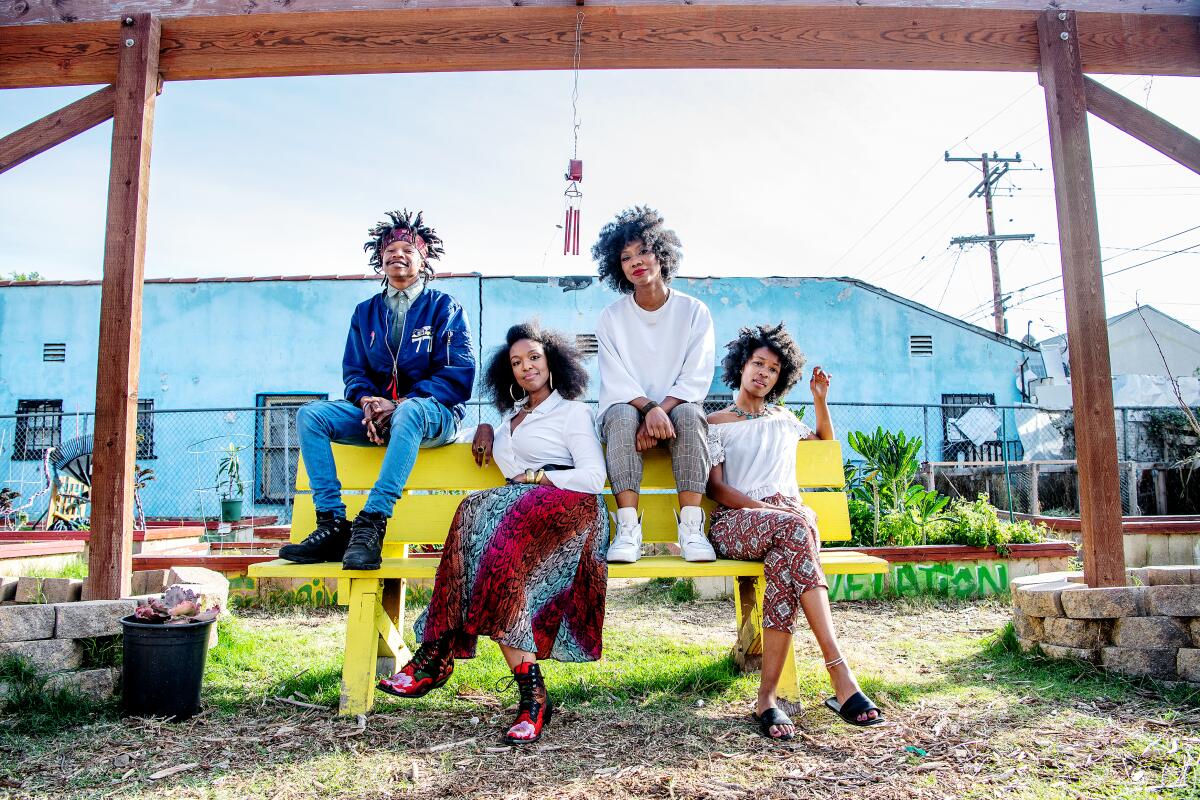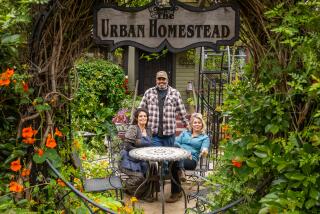The seeds of a mobile Black farmers market are sprouting

- Share via
In June, Carmen Dianne was attending a makeup mentorship program but her focus was elsewhere.
The event came on the heels of George Floyd’s death, and the Black makeup artist felt as if a switch had flipped inside her. That day she told herself her community needed grocery stores, a seed of an idea that has since grown into a full-fledged plan for a mobile market featuring Black farmers, chefs and food producers.
“Over quarantine, there’s been a lot of time to really see the world in different ways and observe everything that’s been happening,” said Dianne, 32.
After many long discussions with her friend Kara Still, a 37-year-old Black fashion designer, they hit on the idea of a 48-foot-long mobile trailer that’s half farmers market and half food truck; they christened it Prosperity Market. The plan is for the trailer to travel to different Los Angeles neighborhoods as a convenient way for people to support Black businesses with their purchases. It also will make appearances in low-income areas, with the goal of offering free nutrition education, cooking classes and grocery giveaways.
Dianne and Still are in the midst of crowdfunding a $50,000 deposit to begin building their custom trailer (which will cost $140,000), with hopes of having it up and running by Juneteenth.
In the meantime, they’ll be hosting monthly pop-ups with their lineup of Black purveyors, starting with a three-day event at the end of this month. The first day, Feb. 26, will be a virtual market where customers can preorder online and do a contactless, drive-through pickup. On Feb. 27, an in-person farmers market at Inglewood’s Faithful Central Bible Church will highlight vendors such as IGH Gardens, Farmer Ken and Hella’s Salsa (it also will be the pickup site for customers who preordered online). The weekend will close out with a free produce giveaway in South L.A.
Early in the planning process, Dianne did research on Black farmers in the United States and was surprised to learn that there aren’t many. “We have less than 2% of Black farmers in the nation right now,” Dianne said. “In the 1920s, we had almost a million Black farmers. The number has steadily declined because [they] were denied bank loans, or they would get bank loans late, or they would get them at way less amounts than they requested. So, with less money, they would have smaller harvests. They made smaller profits. And eventually, there were foreclosures.”
The partners found their first Black farmers through Compton Community Garden. “We realized that we had to go find smaller farmers, like we’re not going to find the big farm plots, because they’re not in South L.A. or even in Southern California as a whole,” Dianne said. “Most of the Black farmers that are here [in California] are in Fresno or they’re in the Bay [Area]. So, we’ve had to find the community gardens and the urban farmers.”
Dianne and Still formed a partnership with Adrienne Wilson, founder of Feed Our Soul, an organization that addresses the issue of food deserts. Wilson has been instrumental in connecting them with contacts in the food and nonprofit sectors and providing guidance on organizing farmers markets.
“It’s super inspiring to watch and see … [them] figure out what is really the problem and how they can be a solution to that problem,” said Wilson. “And especially in the food space, where we have so many issues … with food deserts and food insecurity. They are really focused on shining a different light on that and creating prosperity in our communities.”
Ken Sparks (a.k.a. Farmer Ken) is another leader in the community who is advising Dianne and Still. Sparks, who does garden consultations and installations, will be at the pop-up selling produce — including African blue basil, kale and Swiss chard — he grows in his East L.A. backyard.
Sparks is happy to be part of it all. “‘Equity’ is one of the words that speaks to my mind, just making sure that there’s an option for people to have healthy food,” he said. “Fresh food grown locally is another thing that’s very important to me.”
Sparks introduced the women to Charles Southward, a U.S. Air Force veteran who previously experienced homelessness and now runs the nonprofit IGH Gardens in Bell. Southward donates produce he grows, like collard and mustard greens, to homeless communities and aims to teach others gardening skills.
“I’m really happy that they tried to bring all of us together and that we can serve the community,” said Southward.
For Dianne and Still, it takes a village to enact change.
“We all have our own contributions … and there’s no competition,” Still said. “It’s really a collective effort to support and grow and uplift one another. … And this is the vehicle, literally, that we’re choosing to create that.”
More to Read
Eat your way across L.A.
Get our weekly Tasting Notes newsletter for reviews, news and more.
You may occasionally receive promotional content from the Los Angeles Times.










